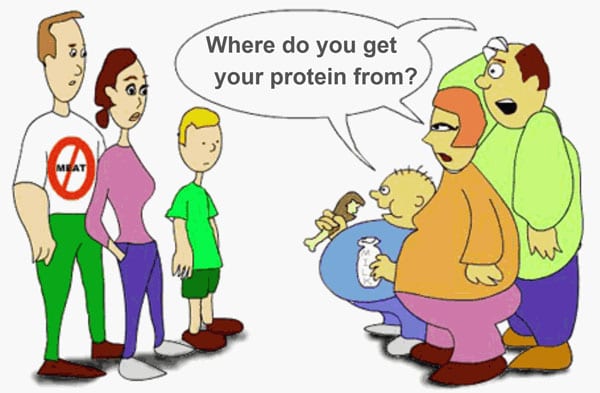Vegetarian diet is popular because of its numerous benefits and weight loss or becoming fit is a big reason among many reasons for becoming vegetarian. But animal products are rich in major nutrients like proteins and fats while some important vitamins and minerals are also found in high amount as compared to plant based product. It is not like that vegetarian food doesn’t provide these nutrients but the thing is, you have to eat variety of food in order to meet the daily requirement of these nutrients. In simple words, you have to pay special attention on these key nutrients such as proteins, vitamins and minerals in your vegetarian diet.

Here is the list of these nutrients and how to include them in your vegetarian diet:
Proteins
The first thing hits your mind when you think of giving up your meat based diet is that from where you will get proteins. It is true that meat is a rich source of protein but there are many plant sources such as legumes, beans, lentils, tofu etc. which provides same amount of proteins as meat. But before you pile up your plate with different plant sources, you should know your daily requirement of protein.
It is very simple to calculate your daily protein requirement because it is the same as your weight in kilograms. Just divide your weight in pounds by 2.2. For example, if you are 150 pounds means 68.2 kilograms then you should consume 68.2 grams of proteins daily.
Vitamin B12
This vitamin is important for growth of red blood cells and maintenance of nervous system but the rich source of this vitamin is meat and meat based products. Therefore, in order to get adequate amount of this vitamin, you have to eat vitamin B12 fortified food such as fortified vegan cheese, yogurt, non dairy drinks, cereals, meat substitutes and yeast. If you are not on a restricted vegetarian diet or vegan diet then you can get enough vitamin B12 from eggs and dairy products.
The daily recommended amount of vitamin B12 is 2.4 micrograms (mcg) for adult male and females. If vitamin supplement is necessary for you then try to take multivitamin supplement which provides minimum 10 mcg of vitamin B12. If you have to take a weekly dose of this vitamin then a large dose of 2000 mcg should be taken once a week.
Vitamin D
Our skin can synthesize this vitamin by exposing the dermal layer to the sun but bad weather and application of many chemical based creams such as sunscreen and other factors like indoor jobs hinders this process. The plant based sources for this vitamin are very limited while salmon and egg yolk are rich in vitamin D. so if you are not a vegan then you can get enough vitamin D from eggs and salmon. The recommended amount of this vitamin is 600 international units (IU) up to 70 years of age and it increases to 800 IU for above 70 years old.
Calcium
This mineral is important for bones and muscle functioning but people don’t get the right amount of calcium. People of age group 18 – 50 need 1000 milligrams while people more than 50 years of age needs 1200 milligram of calcium daily. If you are a vegan or vegetarian who don’t consume dairy products or eggs then you should include non dairy calcium food such as chickpeas, broccoli, dried figs, enriched whole-wheat bread, calcium-set tofu, and calcium-fortified soy cheese, orange juice, or cereal in your diet. Even if you are taking eggs and dairy products, you should take these non dairy calcium rich foods to maintain a healthy level of calcium in your blood stream.
Iron
This mineral comes in two forms i.e. heme and non-heme. Heme form is readily absorbed in body and found in meat and meat based products while plant based food is rich in non heme iron which is poorly absorbed by the body. therefore, try to eat variety of plant based iron rich sources like legumes, fortified veggie meats, nuts and seeds, prunes, raisins, blackstrap molasses, fortified cereals and grains, kale, and broccoli. Be careful about oxalate containing food such as spinach, beet greens, rhubarb, and Swiss chard because this acid binds with the iron and make it unusable to the body. Do not drink tea or coffee with iron rich food because tannin, a chemical in these beverages interferes with the absorption of this nutrient. To increase the absorption of iron in the body, you should take source of vitamin C in your diet while you are consuming iron source.
Zinc
This nutrient is vital for various biological processes such as metabolism, immunity and healing processes. The plant based sources of zinc has lower absorption level therefore you should maximize your zinc intake in the body. You can do this by consuming variety of plant based zinc sources such as whole grains, wheat germ, tofu, tempeh, Miso, legumes, nuts, seeds, eggs and dairy products. Soaking nuts, legumes and beans can increase the zinc absorption in the body. Sprouting of lentils (brown, green and French) also increases the absorption of it in the body.
Iodine
This is crucial for maintaining healthy metabolism in the body but some plant sources such as soy, flax seeds, and raw cruciferous vegetables (broccoli, Brussels sprouts, cauliflower, and cabbage) contains goitrogens which can enlarge the thyroid gland therefore large amounts of soy should not be taken with inadequate iodine intake because it can make iodine deficiency worse. Now days, many multivitamin supplements also contains iodine therefore you should either take supplements or eat iodine fortified food items.

